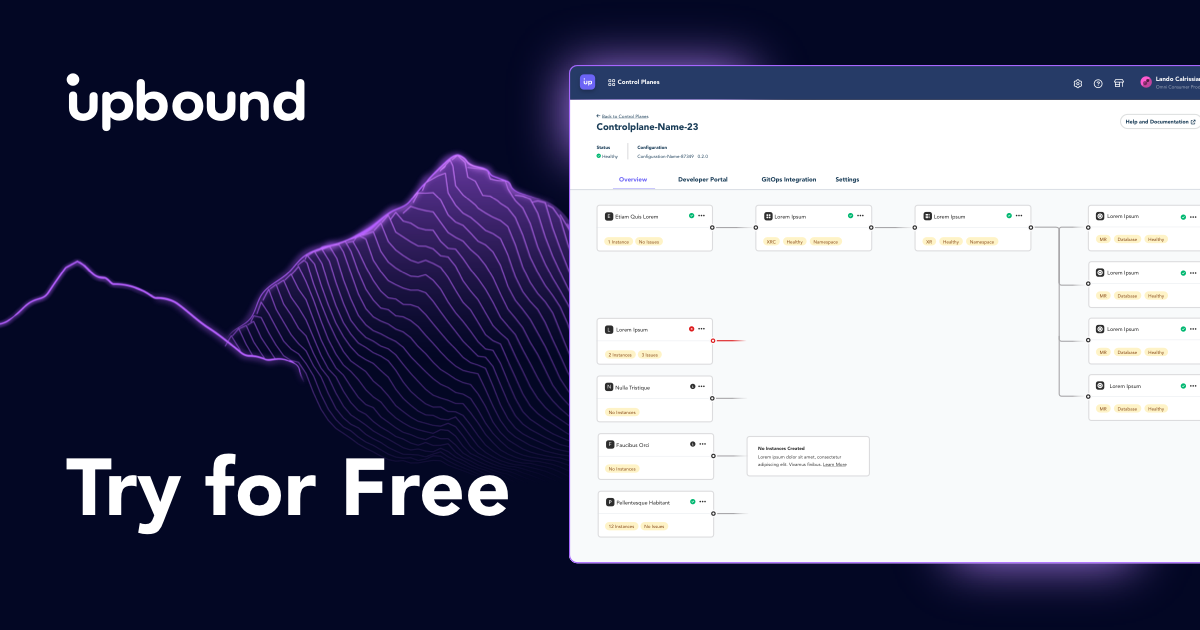New from Upbound: Improved Control Plane Dashboard and Configuration List
Managed control planes make it easier to implement a multi-control plane architecture because the management of underlying infrastructure is handled by Upbound. Whether the right boundary between control planes is environment (development, staging, production), business unit, region, or cloud account, our customers are empowered to choose the right number of control planes for their business context without increasing their maintenance burden. Read on to learn how we’ve been improving Upbound’s user interfaces in tandem to ensure they will support core operator workflows at scale.
More control planes? No problem!
In our latest release, the Console dashboard now comfortably displays the key details of up to 100 control planes in a single table and supports filtering by control plane name. From the dashboard, you can see the status of each control plane, check whether an updated version of its installed configuration is available, and quickly click into its detailed overview page.

We’ll continue iterating on this experience with the goal of providing you with a platform-level dashboard for monitoring health and identifying issues in need of attention – no matter how many control planes you’re running.
View and install Configurations with ease
Control plane configurations are Crossplane packages that bundle the definitions (XRDs) and implementations (compositions) for one or more APIs. They allow you to offer up a set of versioned, custom APIs that your end users can use to interact with a control plane and make resource claims. With our latest release, you can now view all of your configurations in a single table and navigate seamlessly to the detailed overview for each. We currently support searching this table by configuration name, with more filtering enhancements on the way.

We’ve also made a similar improvement to the control plane creation experience. When creating a new managed control plane, your available configurations are now presented in a convenient table showing key details such as name, source repository, creation date, and the number of control planes already running a version of the configuration.

Further enhancements to the Events tab
Two weeks ago we announced a new section within the control plane explorer that surfaces Configuration and Provider events. In our latest release, we’ve improved the Events tab so that it displays Crossplane events as well so that you do not need to head to the command line to access events emitted by your managed control planes. In addition, you can now filter down the event stream by event type and status, sort the list by recency, and toggle whether the events stream refreshes automatically.

Improvements & Fixes
- As you saw in the above screenshots, the Upbound Console now has a new look and feel including enhancements to navigation.
- In response to customer feedback, the default visibility when cloning a Configuration to a new repository is now private. You can still choose to make the repo public if desired, but for the majority of users this will save you two clicks during Configuration creation.
- We found and fixed a bug that affected the performance of queries (e.g. kubectl get XComposite) to a managed control plane’s API server. General queries on a managed control plane should now process much faster.
If you have feedback, a feature you’d like to see, or want to chat with the Product team, you can find us in the #Upbound channel of the Crossplane community slack.
What’s Next?
Want to try out Upbound for yourself? Enable SRE and platform teams with a more efficient workflow and the building blocks of platform engineering by setting up your first cloud platform powered by Upbound’s managed control planes. Sign up for your 30 day free trial here!

On behalf of the Upbound team,
Sam Alipio
